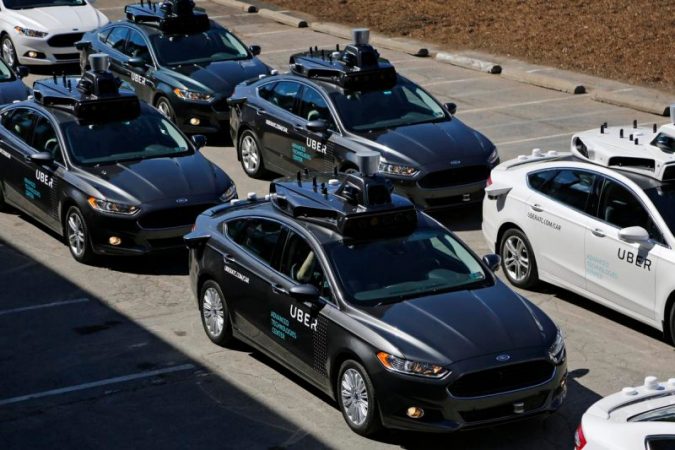Uber said on Twitter that it is “fully co-operating” with the investigation after one of its autonomous vehicles struck and killed a woman in Arizona. The death is believed to be the first death involving a self-driving car.
The Associated Press
A spokesperson for Uber Canada confirmed that the ride-sharing company is pausing self-driving operations in Phoenix, Pittsburgh, San Francisco, and Toronto, a move she called “standard procedure.”
The decision comes after a self-driving Uber SUV struck and killed a pedestrian in suburban Phoenix overnight Sunday.
The Volvo was in self-driving mode with a human back-up operator behind the wheel when a woman walking a bicycle outside a crosswalk in Tempe on Sunday night was hit, police said.
The woman, Elaine Herzberg, 49, died at a hospital.
Depending on who is found to be at fault, the accident could have far-reaching consequences for the development of self-driving vehicles, which have been billed as potentially safer than cars with humans at the wheel.
Last fall, Uber began operating two autonomous vehicles in Toronto, both of which did not accept paying passengers. Uber did not provide details as to where in the city its autonomous cars were being tested, nor how long they will stay off the road.
Uber told the Star in October 2017 that all testing was being done near the University of Toronto
In January 2016, Ontario became the first Canadian province to allow on-road testing of autonomous vehicles. The pilot project requires a driver to remain behind the wheel at all times to monitor the vehicles’ operation.
The testing has been going on for months as automakers and technology companies are competing to be the first to make self-driving technology commercially viable.
Uber CEO Dara Khosrowshahi expressed condolences on his Twitter account and said the company is working with local law enforcement on the investigation.
The National Transportation Safety Board and the National Highway Traffic Safety Administration said they are sending teams to investigate.
The crash could be a setback for autonomous vehicle research and lead to stricter regulations from states and the federal government, said Bryant Walker Smith, a University of South Carolina professor who studies the technology.
But Smith said more than 100 people die each day on U.S. roads in crashes of human-driven vehicles.
“That’s a real contrast that we should keep in mind about this,” he said. “We should be concerned about automated driving. We should be terrified about human driving.”
Ontario Ministry of Transportation spokesperson Bob Nichols wrote in an email that the ministry is saddened to learn of the Arizona incident, is “following the situation in Arizona closely, and will consider what measures are appropriate as more becomes known.”
“All companies testing autonomous technology on our roads are expected to follow a strict set of guidelines and rules, designed to provide the utmost safety for all road users,” wrote Nichols. “We regularly communicate with our pilot program participants about safety.”
The U.S. federal government has voluntary guidelines for companies that want to test autonomous vehicles, leaving much of the regulation up to states.
Many states, including Michigan and Arizona, have taken a largely hands-off approach, hoping to gain jobs from the new technology, while California and other states have taken a harder line.
California is among states that require manufacturers to report any incidents during the autonomous vehicle testing phase. As of early March, the state’s motor vehicle agency had received 59 such reports.
Arizona Gov. Doug Ducey used light regulations to entice Uber to the state after the company had a shaky rollout of test cars in San Francisco. Arizona has no reporting requirements.
Hundreds of vehicles with automated driving systems have been on Arizona roads.
Ducey’s office expressed sympathy for Herzberg’s family, and spokesman Patrick Ptak said: “Public safety is our top priority.”
The crash in Arizona isn’t the first involving an Uber autonomous test vehicle. In March 2017, an Uber SUV flipped onto its side, also in Tempe. No serious injuries were reported, and the driver of the other car was cited for a violation.
Herzberg’s death is the first involving an autonomous test vehicle but not the first in a car with automated control features. The driver of a Tesla Model S was killed in 2016 when his car crashed into a tractor-trailer in Florida.
The NTSB said driver inattention was to blame, not the vehicle’s autopilot system. The agency said automakers should have safeguards that keep drivers engaged.
The U.S. Transportation Department is considering further voluntary guidelines that it says would help foster innovation. Proposals also are pending in Congress, including one that would stop states from regulating autonomous vehicles, Smith said.
Peter Kurdock, director of regulatory affairs for Advocates for Highway and Auto Safety in Washington, called the Arizona crash tragic.
The group sent a letter Monday to Transportation Secretary Elaine Chao saying it is concerned about a lack of action and oversight by the department as autonomous vehicles are developed. That letter was planned before the crash.
Kurdock said the deadly accident should serve as a “startling reminder” to members of Congress that they need to “think through all the issues to put together the best bill they can to hopefully prevent more of these tragedies from occurring.”
